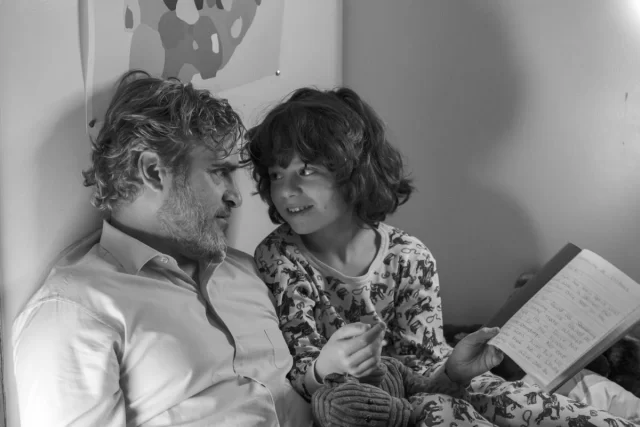C’mon C’mon: Never Never, by David Bax

There’s a roadblock to my appreciation of Mike Mills C’mon C’mon that keeps popping up as the movie goes along. Johnny (Joaquin Phoenix) is some sort of radio or podcast producer and, throughout the story, he’s working on some cringe-ass NPR bullshit type of project where he’s interviewing little kids on the topic of “the future.” It’s the kind of sickly pacifying feel-good pablum that middlebrow audiences feast on to distract themselves from the gnawing concern that they might be part of the world’s problems. And Mills’ adoring treatment of this content seems to be encouraging a cutesy, facile reading of a film that actually has more on its mind.
On the other hand, Johnny’s nationwide search for wise tykes means we get to visit various American cities. Detroit, Los Angeles, New York City and New Orleans are all rendered in gorgeous art gallery black and white by cinematographer Robbie Ryan.
Outside of the unfortunately prevalent runner involving Johnny’s job, Mills takes pains to counteract the looming cutesiness. C’mon C’mon‘s narrative has a simple logline (“Lonely man bonds with his troubled nephew”) that threatens a suffocating, saccharine story. But Mills resists being pat. Take nephew Jesse’s (Woody Norman) preferred game of make believe, pretending he’s an orphan and that the adult to whom he’s talking has adopted him out of grief after the loss of their own child. It sounds insufferably precious but Mills focuses less on Jesse’s macabre imagination and more on Johnny’s deep discomfort with it.
That also requires Norman to thread a needle in his presentation of the character. Jesse is a precocious kid but Norman is not giving a precocious performance. It’s a crucial bulwark against C’mon C’mon becoming unbearable.
Jesse having layers to his personality is not just down to good acting and writing. At its core, C’mon C’mon is a movie about getting to know another person and, more importantly, letting another person get to know you, bit by bit. Johnny records sound for a living, an activity in which Jesse takes an interest, pointing shotgun mics at planes and skateboarders, listening in through oversized headphones. Isolating the sound of something has a way of exaggerating and changing it, like the piano in Aaron and Bryce Dessner’s score, recorded in such a way that the falling of keys and hammers is audible; it’s more clear but not necessarily more real. The first time Jesse and Johnny talk over the phone, the boy doesn’t recognize his uncle’s voice. It sounds different out of context. On its own, removing and presenting just one component of an entity is misleading. But abstracting pieces of ourselves is a way to make ourselves understood. It takes time and patience to know and be known on multiple levels.
When Johnny is moved by the children’s books he reads to Jesse or when he complains about his nephew to the boy’s mom (Gaby Hoffmann), “He’s spoiled or I am,” it drives home the feeling–especially among us childless adults–of never having quite grown up. Making Johnny as much a vulnerable kid as Jesse is a better approach than trying to make the kids Johnny interviews seem like wizened elders.





























